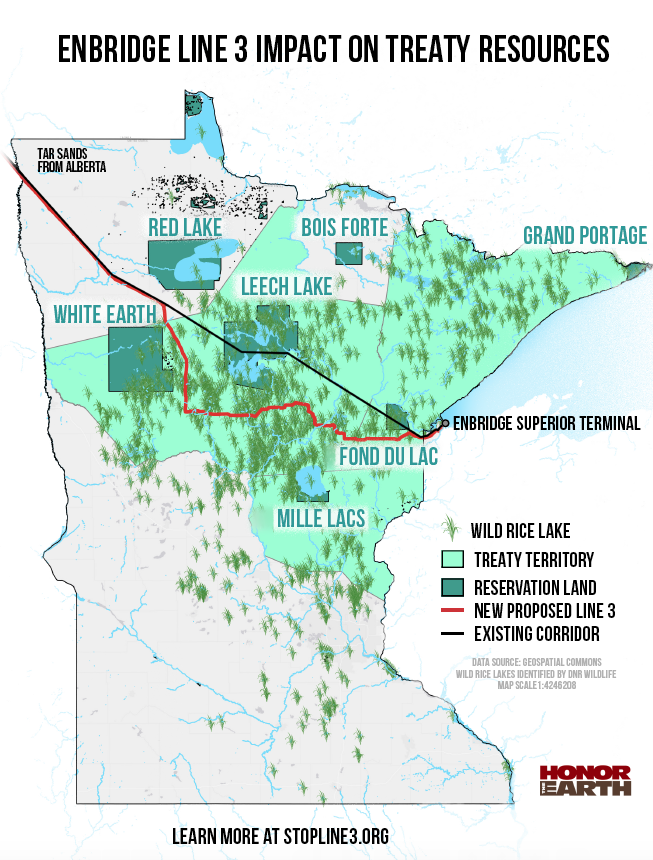 Written by Scott Russell
Written by Scott Russell
This blog originally appeared in Healing Minnesota Stories
Enbridge’s stock price were down 4.7 percent this morning, following the release Monday of an Administrative Law Judge’s recommendations on the Enbridge Line 3 tar sands pipeline through northern Minnesota.
Judge Ann O’Reilly released her 370-page report on Monday, rejecting Enbridge’s preferred new route, but allowing the pipeline to move forward under certain conditions. Her report apparently worried financial markets about the project’s viability. According to the Reuters story: Enbridge shares fall on Minnesota pipeline route ruling.
… the project has run into opposition in Minnesota from the state, along with Native American tribes and environmental activists who have questioned whether the replacement is needed.
Truth be told, Line 3’s supporters and opponents are still scratching their heads to figure out the impact of O’Reilly’s recommendations. One thing is clear, O’Reilly was listening when Line 3 opponents criticized Enbridge’s tactics of calling its new Line 3 proposal a “replacement project” when it’s anything but a replacement project.
Enbridge’s current Line 3 is old and failing. Enbridge’s “replacement project” sought to abandon the old Line 3 in the ground and to build a new and larger Line 3 along a new route.
O’Reilly’s recommendations make Enbridge live up to the term “replacement,” at least in part. They say the only way the project would meet a cost-benefit analysis — and justify a Certificate of Need — would be if the company removed the old Line 3 from its existing trench and used the same trench for the new Line 3.
That is — to actually do something closer to a replacement project. Still, O’Reilly’s recommendations fall short of making this a true replacement project; they allow Enbridge to replace the old Line 3 with a larger pipeline.
So why are the financial markets acting sketchy? It could be because O’Reilly's recommended option would cost Enbridge an additional $1.3 billion (the cost of removing the old pipeline). It would also put Enbridge in legal conflict with Ojibwe bands. The new pipeline, like the old pipeline, would cross their lands. Leech Lake has made it clear any efforts to build a new pipeline across their lands would lead to “conflict.”
For more on O’Reilly’s recommendations, see yesterday’s blog: . O’Reilly’s recommendations now go to the Minnesota Public Utilities Commission (PUC), which is expected to cast final votes in June on Line 3’s Route Permit and its Certificate of Need.
The criticism of Enbridge’s use of the term “replacement project” was raised in a Sierra Club legal brief on Line 3. On pages 32-33 it reads:
Enbridge insists on calling this large new pipeline, in a new corridor, with the ability to carry new product and nearly twice as much of it, and a larger diameter a “replacement.” The proposed Project is in every way a new pipeline and treating it as a replacement is inappropriate unless the applicant purports to remove and replace the old Line 3 pipeline. Enbridge’s continued euphemistic assertion that this Project is a “replacement” is simply a marketing ploy and legal framing, but when the basic facts are acknowledged it is a demonstrably false narrative.
As noted in yesterday’s blog, Ojibwe bands will strongly oppose a Line 3 project which uses the existing Line 3 trench crossing tribal lands. For more on that, here is the Leech Lake’s Line 3 resolution, passed in November on a unanimus vote. It reads in part:
THEREFORE, BE IT RESOLVED, That the Leech Lake Tribal Council does hereby give notice to all Minnesota State and Federal government entities to remove Line 3 off the Leech Lake Indian Reservation, effective immediately.
THEREFORE BE IT FURTHER RESOLVED, AS FOLLOWS:
- That the Leech Lake Tribal Council does hereby with today’s resolution proclaim any attempt by any entity of the State of Minnesota to approve a route across the Leech Lake Indian Reservation as an attack on tribal sovereignty; and
- That the Leech Lake Tribal Council does hereby warn that any attempt to cross the Leech Lake Indian Reservation will lead to conflict; and
- That the Leech Lake Tribal Council will not approve a route across the Leech Lake Indian Reservation.
Here are links to news coverage:
- AP: Judge: Enbridge Line 3 project should follow existing route
- AP: The Latest: Environmental groups oppose Enbridge ruling
- Duluth News Tribune: Judge says Line 3 should go forward along old route
- MPR: Ruling on Line 3 leaves both sides seeing benefits
- MPR: Pipeline plan tests state’s environmental-business balance
- MPR: Line 3 Timeline